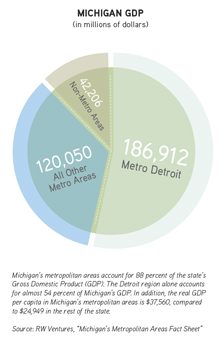Strength in Structure
Building the Case
At a time when our state and local resources are diminishing, there is a need to advocate for a strong return on investment for local services. This goes beyond “fix it first” policies and local match requirements. Although it might make sense in some cases to fix outlying
in more sustainable projects. Local governments and the State need to recognize that 20th century service provision is not matching the demands or needs of the 21st century economy.
Michigan cities and villages provide the necessary services that people expect from their local governments—police and fire protection, sewer and water, roads, infrastructure, garbage collection, recycling, etc. But with increasingly fewer resources to support these services, it is important to seek out innovative solutions together and recognize the evolving economic reality: that our economic output is linked directly to the state’s metropolitan areas and smaller commercial corridors. Michigan’s metropolitan regions account for 88 percent of the state’s Gross Domestic Product (GDP),14 so it only makes sense that support and resources are dedicated and aligned for projects related to urban growth. That means stopping generalized expansion of infrastructure and development that creates a drain on our communities and state. Let’s target our resources in order to maximize our outcomes.
A study just released, entitled Building Better Budgets, by Smart Growth America, showed three key findings:
-
Smart growth development costs one-third less for upfront infrastructure.
-
Smart growth development saves an average of 10 percent on ongoing delivery of services.
-
Smart growth development generates 10 times more tax revenue per acre than conventional suburban development.
Proposed Policy Actions
Another essential component to sustainable places is to commit to solving structural insolvency. Michigan can no longer afford to incentivize continued development that will only lead to a greater inability to maintain infrastructure. As the study shows, it makes no economic sense to place greater fiscal strain for maintenance on residents. This reality leads us to propose the following solution:
-
Create new community growth legislation to make Michigan laws more growth friendly which will encourage more effectual land use and the efficient use of existing infrastructure. This will help ensure sustainability of municipal borders, prevent increased infrastructure costs for rural areas, and reverse decades of costly low density growth that simply does not provide an appropriate return on investment. It will also enable communities that are already urban in character to expand their boundaries to accommodate new infrastructure to be added on to the existing built-out infrastructure. In addition, it will require schools to adhere to local zoning.
Download: Partnership for Place: An Agenda for a Competitive 21st Century Michigan